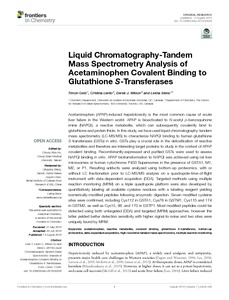Geib, Timon; Lento, Cristina; Wilson, Derek J. et Sleno, Lekha
(2019).
« Liquid Chromatography-Tandem Mass Spectrometry Analysis of Acetaminophen Covalent Binding to
Glutathione S-Transferases ».
Frontiers in Chemistry, 7.
Fichier(s) associé(s) à ce document :
![[img]](http://archipel.uqam.ca/13248/1.hassmallThumbnailVersion/fchem-07-00558.pdf)  Prévisualisation |
|
PDF (LC-MS/MS Analysis of Acetaminophen Covalent Binding to Glutathione S-Transferases)
Télécharger (890kB)
|
Résumé
Acetaminophen (APAP)-induced hepatotoxicity is the most common cause of acute
liver failure in the Western world. APAP is bioactivated to N-acetyl p-benzoquinone
imine (NAPQI), a reactive metabolite, which can subsequently covalently bind to
glutathione and protein thiols. In this study, we have used liquid chromatography-tandem
mass spectrometry (LC-MS/MS) to characterize NAPQI binding to human glutathione
S-transferases (GSTs) in vitro. GSTs play a crucial role in the detoxification of reactive
metabolites and therefore are interesting target proteins to study in the context of APAP
covalent binding. Recombinantly-expressed and purified GSTs were used to assess
NAPQI binding in vitro. APAP biotransformation to NAPQI was achieved using rat liver
microsomes or human cytochrome P450 Supersomes in the presence of GSTA1, M1,
M2, or P1. Resulting adducts were analyzed using bottom-up proteomics, with or
without LC fractionation prior to LC-MS/MS analysis on a quadrupole-time-of-flight
instrument with data-dependent acquisition (DDA). Targeted methods using multiple
reaction monitoring (MRM) on a triple quadrupole platform were also developed by
quantitatively labeling all available cysteine residues with a labeling reagent yielding
isomerically-modified peptides following enzymatic digestion. Seven modified cysteine
sites were confirmed, including Cys112 in GSTA1, Cys78 in GSTM1, Cys115 and 174
in GSTM2, as well as Cys15, 48, and 170 in GSTP1. Most modified peptides could be
detected using both untargeted (DDA) and targeted (MRM) approaches, however the
latter yielded better detection sensitivity with higher signal-to-noise and two sites were
uniquely found by MRM.
| Type: |
Article de revue scientifique
|
| Mots-clés ou Sujets: |
acetaminophen, reactive metabolite, covalent binding, glutathione S-transferase, bottom-up
proteomics, data-dependent acquisition, high-resolution tandemmass spectrometry, multiple reactionmonitoring |
| Unité d'appartenance: |
Faculté des sciences > Département de chimie |
| Déposé par: |
Lekha Sleno
|
| Date de dépôt: |
07 févr. 2020 08:45 |
| Dernière modification: |
07 févr. 2020 08:45 |
| Adresse URL : |
http://archipel.uqam.ca/id/eprint/13248 |





 Altmetric
Altmetric Altmetric
Altmetric
